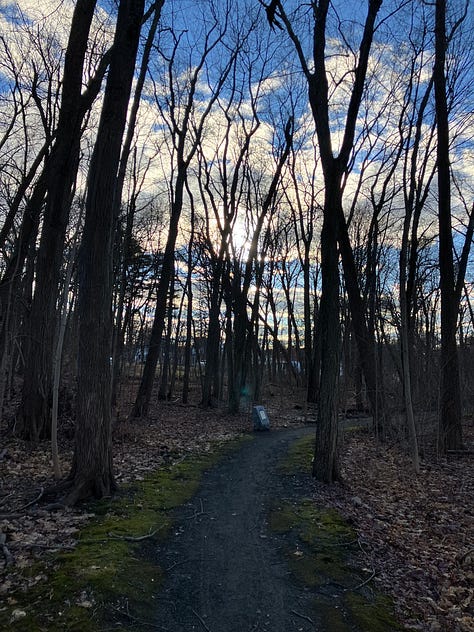Truth in Fiction...what's next?
Publishing A Hong Kong Story, my upcoming projects, and a job



Hello Matterhorn Readers!
We are deep in winter in Switzerland now — my favorite time of year. I find that my best creative moments are either in the snow itself or looking out at it from a window. Bliss. Some say I am a little obsessed! Anyway, I will not write more about snow today; rather I am writing about the fruits of discoveries made thus far in this winter. I am writing today to keep you posted as I move into the next part of Truth in Fiction on The Matterhorn and prepare for some changes in the rest of my life.
I had an unusual December. The first week was a last-minute trip to London for a job interview and the ensuing three weeks were in and around Lexington, Massachusetts, where I’m from. During that time, I was largely offline, accepted a job offer, and made plans to move country.
In my hometown, I enjoyed Hawthorne’s beautiful and often surprising prose in The House of Seven Gables as well as several fascinating films: Maestro, Umami, and Living. My husband also beat me and my parents at Scrabble many times over, which was still rather enjoyable with the right snacks.
At the same time, I was considering the next steps for this publication. Here’s a little preview, which I’ll explain more below —
💥 New post schedule 💥
Every Saturday, starting in March: serialized fiction — An Interpreter in Vienna
Monthly on a Tuesday: sketch ⬩ text
Monthly on a Tuesday: discussion thread about the layers of fiction
+ occasional essays, collaborations, or updates.
As always, you can toggle any section on or off to choose which emails you receive.
What’s next for fiction?
Firstly, thanks so much for your invaluable feedback about A Hong Kong Story and the related podcast! I’ve decided to switch gears because this novel is just too long for serialization (for me), and I need a little break from the podcasts. I’d like to continue them later, so do let me know what you’d like to hear. I’ve got a few ideas of what direction these might take.
Next week, I’ll be sharing the option to purchase an e-book or paperback of the entire novel. I’ll be sending a free e-book to all paid subscribers this weekend (which you can also access if you upgrade to become a patron at any time).
To coincide with Chinese New Year, I’ll also publish half of a later chapter during that time period. Ivy is all set up in a new flat. She’s still kind of a mess at this point though! She’s about to hit the dating scene, you’ll be pleased to hear, and surfing in Bali has helped propel a bit of a transformation. You’ll receive this next week.
📚 📚 📚 📚 📚
I’ve decided to serialize my next work of fiction in its entirety here, starting in a month or so. It is also in more manageable chapters and overall length for serialization. I plan to use feedback to inform the eventual publication of the book.
An Interpreter in Vienna is a psychological thriller with potential for a traveling series (Cyprus is next up!). The book takes place in Vienna, which is where I experimented in taking us during the last shared parts of A Hong Kong Story (and discussed in the last 10 minutes of the podcast last week). Maybe you’ll see pieces of those ideas make their way here.
“When a man is tired of London, he is tired of life, for there is in London all that life can afford.” - Samuel Johnson
In other news, I’ve decided to go back to working in a school as a leader and teacher during next academic year. I’ve gained a lot of ideas here that I want to bring to secondary school students and my new team in different forms.
I find that having a balance between solitary creation as a writer and interactive community as a teacher is ideal for me. Sometimes it’s difficult to find the sweet spot, but I discovered during my podcast just how much I miss teaching in a live classroom situation and working on curriculum and related pedagogy.
I’m a far cry from Leonard Bernstein as either creator or teacher, but the scene from an Edward Murrow interview that Bradley Cooper portrayed in Maestro resonated with me. He talks about wanting to create in a solitary way, inward, and to share ideas as a teacher and public figure — this is the tension of the composer/conductor. Here is a video of the original interview [especially at 4:00]. And Cooper spoke with NPR, including a transcript of this scene:
MURROW: (As himself) Lenny, what's the big difference in the life of composer Bernstein and conductor Bernstein?
COOPER: (As Leonard Bernstein) Well, I suppose it's a difference. It's a personality difference which occurs between any composer versus any - or any creative versus any performer. Any performer, whether it's Toscanini or Tallulah Bankhead or whoever it is, leads a kind of public life, an extrovert life, if you will - it's an oversimplified word, but something like that - whereas a creative person sits alone in this great studio that you see here and writes all by himself and communicates with the world in a very private way and lives a rather grand inner life rather than a grand outer life. And if you carry around both personalities, I suppose that means you become a schizophrenic, and that's the end of it.
Schizophrenia is, of course, a debilitating disease and not one to take lightly. Part of the use of the term here by Cooper is culturally historic, where philosophers and cultural theorists were talking about it as a concept in relation to postmodernism in a way that greatly diverged from the mental illness. Although at the time of Bernstein’s interview, schizophrenia (as far as I know) referred to the specific mental illness, Cooper’s inclusion of the term here may connote work in the late twentieth century by scholars.
Some of these theorists were Jean Baudrillard, Fredric Jameson, David Harvey, Mark Currie, John Johnston, and Steven Frosh and can be read about in this book by Angela Woods. Baudrillard’s famous 1983 essay — “The Ecstasy of Communication” — elaborates on these ideas as explained by Robert Hassan in The Condition of Digitality in his open-access chapter: “1989: David Harvey’s Postmodernity: The Space Economy of Late Capitalism”:
[Baudriallard] writes that the individual has become ‘schizophrenic’—both cause and consequence of postmodern culture—and one who is ‘open to everything in spite of himself [and] living in the greatest confusion.’ Baudrillard closes his essay by looking toward the function of the networked computer where the individual is: ‘…now only a pure screen, a switching centre for all the networks of influence.’67 It was a networked view (of fragmentation) that Stuart Hall caught up with in 2011 when writing about neoliberalism as a hegemonic process that (refracted through the technology of the internet) fragments and relativises culture under the illusion of freedom.
Here are some academic articles where the above thinkers are utilized in understanding Borges’s writing, DeLillo’s White Noise, and the film Blade Runner.
I think that in addition to this notion of the busy, (post)modern world around him, what Cooper as Bernstein was getting at is that that the two parts of his personality can feel as if they create the kind of hallucinations that schizophrenics experience if they are not each given room to breathe. Can any of you relate to this in various iterations?
For me, it is the tension of the writer/teacher (put quite generally), but a tension I find enriching more often than frustrating. In any case, these are both at the core of who I am, so it would be impossible to deny one or the other. I believe this is how my podcast emerged in the space of so much time immersed in the act of writing. However, as much as I’ve enjoyed the research and feedback in creating these podcasts, I’ve missed immensely the live interaction with students and colleagues alike. At the same time, I’ve encountered many new writing colleagues here on Substack who continue to enrich my life.
Hence, my new teaching position. For this job and other reasons, we will also be moving to South London this summer. Can’t wait to be a part of the writing and arts-related community there! Hope to see some of you there very soon.
As such, I’ve decided to focus more on fiction writing than podcasting at this moment. That doesn’t mean there won’t be another season in the future! (Requests welcome! Perhaps a series to come related to this next novel or to diversifying the English curriculum…even a closed master course…) I’ve loved podcasting and have learned so much from the process, but I want to free up a little space at this moment.
Instead, I’ll be sharing monthly sketch⬩ text posts, that is: “a written sketch and an encountered text.” You’ll find mini-fiction experiments, ideas about the writing life, meditations on literature, and more. The text will typically be a book recommendation, but will occasionally branch out into other art forms, especially film. I’ll also be spending a lot of time soaking up the culture and nature of Switzerland and hope to share this with you in these posts.
Also once a month, I’ll invite subscribers to participate in a discussion thread related to the layering of fiction I’ve previously been discussing on the podcast. You will again be invited to share your work or your thoughts as a reader.
How can you support my work?
✵ Subscribing for free
Simply by subscribing, you help me to reach more readers. The numbers of subscribers alone also help me to reach publishers and agents or seek funding from academic related organizations. I am grateful for your readership and enjoy interacting with many of you in comments, emails, or Notes. You can always reply to an email to reach me directly.
✵ Sharing my work
If you like something you read or listen to here, sharing it with a friend or your students, through social media or another way will help me to reach more people. Additionally, star ratings on Apple and Spotify increase my podcast’s reach. I appreciate this so much!
✵ Patron model
I’ve decided to keep my patron model, where my posts are freely available although there is an option to pay for a subscription. Paying contributors to my work receive my latest ebook and will receive the next when it is complete. This model is partly to alleviate pressure on myself and allow me a bit of freedom to move in the direction the project takes me. In the future, I may add components for members if, for example, I create another course-like series.
✵ Bookshop.org affiliate shop
If you are in the US, you can also support my work and a cool organization by purchasing books through my Bookshop.org affiliate shop. 10% of profits go to The Matterhorn and 80% go to a variety of local bookshops. You can alternatively select which independent bookstore you’d like your profits to reach. The company is additionally in the UK and Spain (thought not through my affiliate shop).
✵ Read or share my books
You can find everything linked through my website here.
Thanks for continuing with me in this evolving space. I’d love to hear your thoughts in the comments.







Congratulations on the position and move, Kate! The school is lucky to have you inbound!
Also, I applaud you on the pivot for The Matterhorn and am excited for everything that's in store. Your energy and enthusiasm is always infectious.
Those words and quotes about the split creative life resonate.
Congratulations on the new job. You're going to rock! Looking forward to the new Matterhorn! Change is the only constant in the universe, after all.